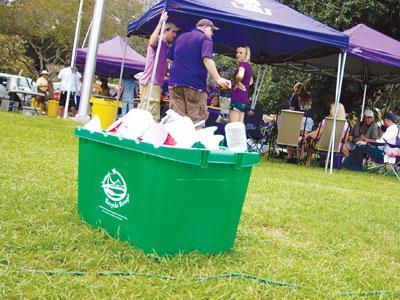Pick up — sustainability is on the hotline.
E-waste, the trash created from throwing away electronics, can be extremely detrimental. Mother Jones reported that though it only represents 2 percent of America’s trash in landfills, it equals 70 percent of overall toxic waste.
This toxic waste can be composed of lead, mercury, arsenic and flame-retardants, and once it rains, a toxic soup can seep into groundwater supplies. Without proper and quick treatment, this can lead to disastrous outcomes. Protecting groundwater, especially when droughts are occur at an alarming rate, should be a major priority.
College students can play a significant role in reducing the amount of e-waste, as many students have thrown away an old flip phone, trashed a broken laptop or finally retired those headphones from your first iPhone.
According to Business Insider, this waste is quite valuable, and collectively, Americans throw away about $60 million worth of gold and silver in conked out phones alone.
The bathroom can also be a hotbed for creating e-waste.
Remember the blow dryer whose coil finally gave out? How about the Oral-B toothbrush whose head dwindled into nothingness? Whatever happened to the flat iron whose plates gave up staying attached by the electrical tape?
All of these products can be recycled instead of thrown away. Recycling them not only reduces the amount of waste created, it also saves the energy required to break them down at the landfill.
In addition to doing well on the homeland, there are more humanitarian benefits to recycling e-waste. U.S. News and World Report reported, “The developed world has in the past exported an estimated 23 percent of its electronic waste to seven developing countries.”
Hacked and chopped away at in crude and hazardous manners, this waste is bored into for the gold, silver and copper hidden beneath rotting wires. The remainder burns away in open fields, with orphans minding the fields and breathing in the toxic fumes, which also are spreading through the air.
These conditions are appalling, but like most things, until it becomes cheaper to keep the waste here or becomes illegal to ship it elsewhere, it stays.
It is possible to do your part in helping to end this global problem. In Baton Rouge, the Capital Area Corporate Recycling Council welcomes old electronics to its warehouse downtown. Once there, they will either refurbish them for needy citizens or properly recycle them, with no cost to you.
LSU is doing its part to combat the e-waste problem by hosting an Electronic Waste Recycling Drive at the Old Front 9 from 9 a.m. to 1 p.m. Thursday. Bring out all your old, obsolete or unusable electronic products and aid in preventing one less orphan from coming into contact with harmful fumes.
Not only will you feel good about yourself, but you will also be able to finally move some crap out of your apartment and get the futon you’ve always wanted.
Garrett Hines is a 21-year-old political science senior from Monroe, Louisiana. You can reach him on Twitter @garrettH_TDR.
Opinion: Sustainability is easy and worthwhile
September 15, 2015

A full recycling bin sits on the Parade Ground on Sept. 19 during tailgating before the LSU football game against ULL.
More to Discover










